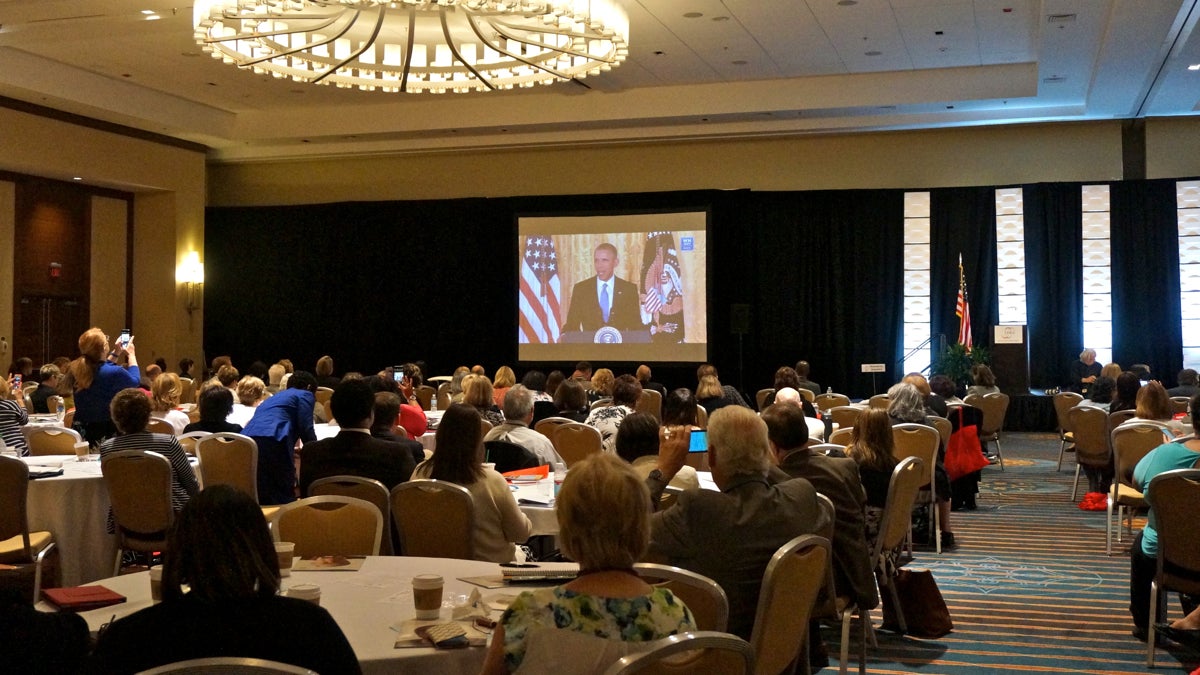Senior issues take center stage at White House, Center City conference
Listen
Those attending the annual meeting of the National Association of Area Agencies on Aging watched President Obama give a speech as part of Monday's White House Conference on Aging. (Jessica McDonald/WHYY)
It’s been a decade since the White House last hosted a conference on aging, and now thousands of baby boomers are retiring every day.
With the demographic shift under way, panelists discussed how best to help older Americans with health and finances. In reference to Social Security and Medicare, President Barack Obama called on the country to “to recommit ourselves to finishing the work that earlier generations began.”
The largest watch party of the event was in Philadelphia, at this year’s meeting of the National Association of Area Agencies on Aging at the Center City Marriot.
Amid jokes about his gray hair and shout-outs to swimming great Diana Nyad and Ruth Bader Ginsberg, Obama laid out his vision for improving the lives of Americans over 60. His plan includes overhauling the quality requirements for nursing homes; increasing training for prosecutors to recognize and pursue abuse of elders; and creating more flexible work policies for workers caring for an elderly person.
To spur retirement saving, he suggested that states require those without workplace retirement accounts to be automatically enrolled in an IRA plan, an idea that has met resistance in Congress.
The president also focused on past successes, noting that the Affordable Care Act had saved Medicare recipients $15 billion on prescription medications.
“They don’t always know that it’s because of Obamacare,” he said, embracing his signature law’s nickname. “But that’s why they’ve been paying cheaper drug prices.”
In the packed Marriot room where the speech was live-streamed, Obama received the most applause for endorsing legislation passed half a century ago.
“We’re going to work with Congress to reauthorize the Older Americans Act,” he said, as the crowd drowned out his words in cheers.
The law provides funds for most of the senior services communities provide, from Meals on Wheels to medical transportation and fall-prevention programs.
“It was wonderful,” said Sandy Markwood, CEO of the National Association of Area Agencies on Aging,. “We really hope that spurs congressional action.”
Often, she said, senior citizens need just one or two supports to stay at home rather than moving to a facility.
“Maybe they need a home-delivered meal; maybe they just need a ride to the doctor’s office,” she said. “Maybe they just need somebody to call and check on them because they’re isolated.”
Holly Lange, who heads the nonprofit Philadelphia Corporation for Aging, said Pennsylvanians get extra support from the state Lottery, which pays for home and nursing care, tax and rent rebates, and the pharmaceutical assistance program. But more could go a long way.
“Many older people in Philadelphia own their own homes,” she said. “And in order to keep a person in their home, they may need some help with a grab bar, a ramp, a doorbell, fixing their locks.”
That waiting list, she said, is 400 seniors long.
WHYY is your source for fact-based, in-depth journalism and information. As a nonprofit organization, we rely on financial support from readers like you. Please give today.

